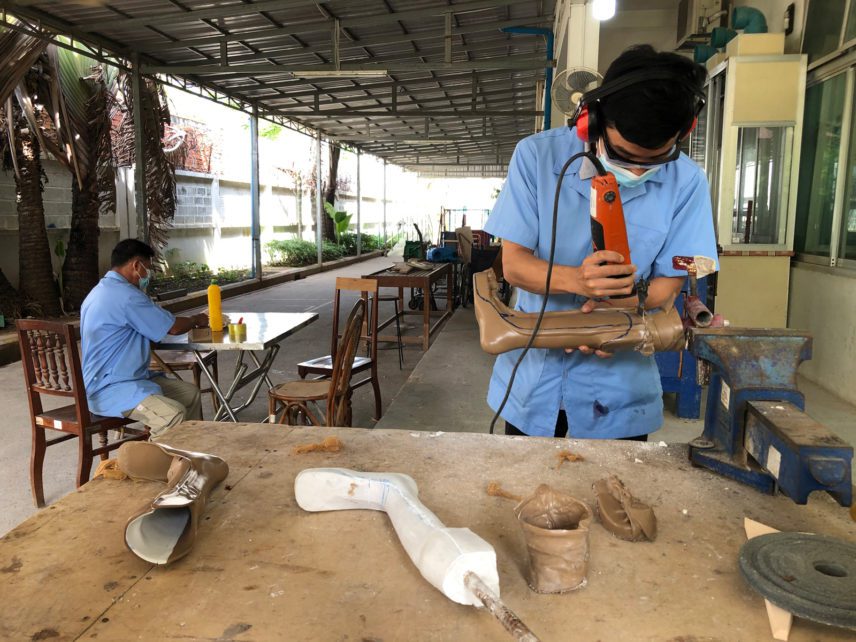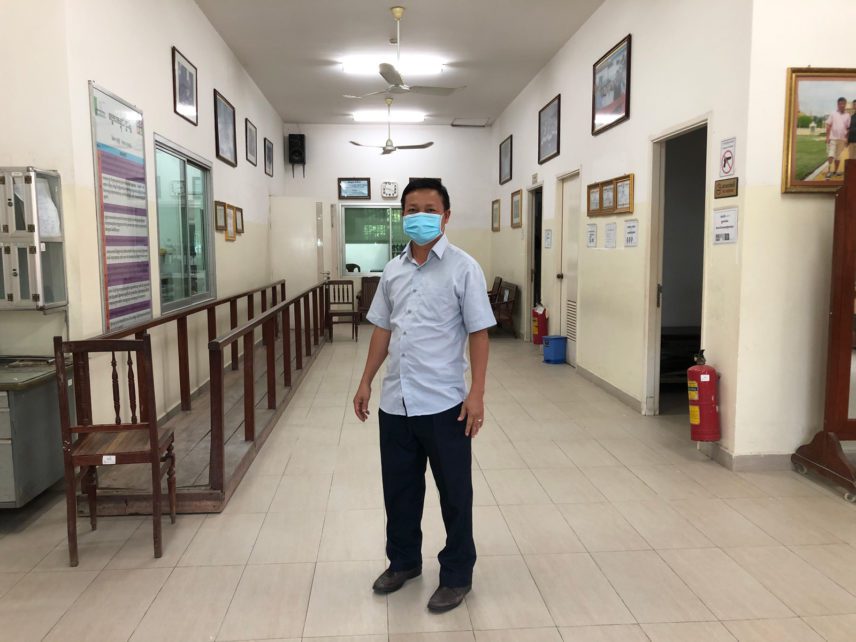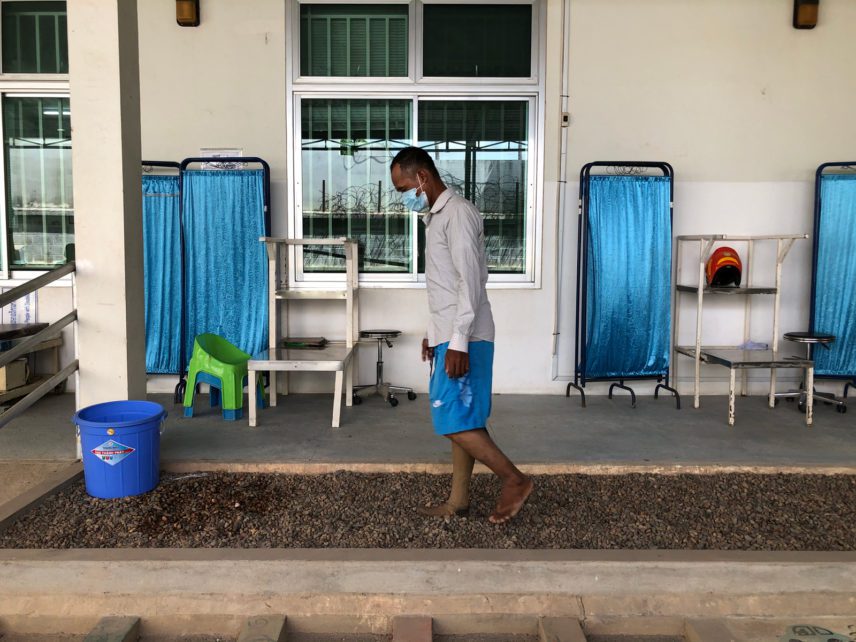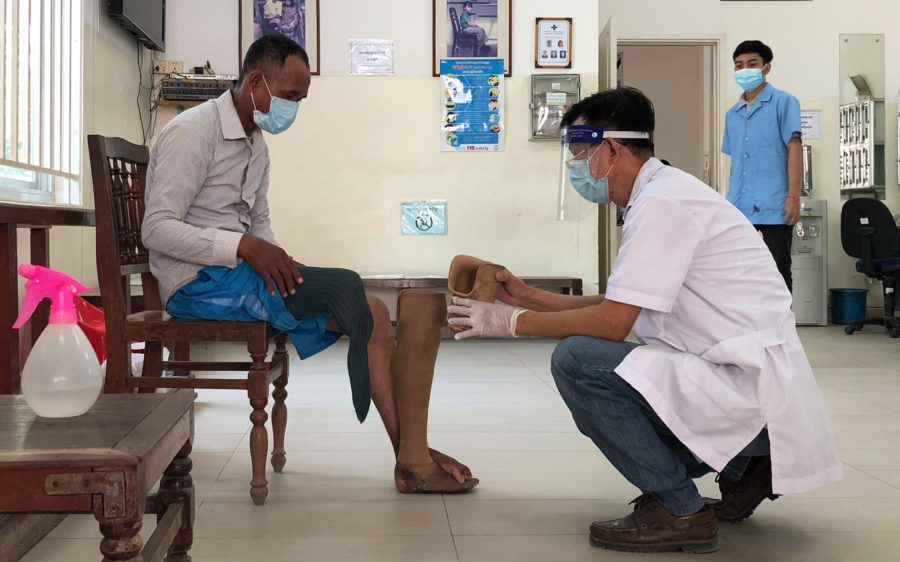In early May, Seng Kosal’s right leg began to hurt badly.
Kosal, who lives in Kandal Province, outside of Phnom Penh, lost the lower part of his leg in a traffic accident and has been using his current prosthesis, which starts below his knee, for nearly four years.
The device had been starting to fit more loosely around his stump, and then an abscess formed where the stump rubbed against the lining of the prosthesis. The pain became so severe, he says, that walking farther than the distance from his bed to his bathroom was impossible.
Kosal had made his living breeding and raising goats. But the pain from his loose prosthesis forced him to stop tending to his herd.
The loosening of a prosthetic device over time is normal—the stump left behind after an amputation gradually loses muscle mass, and the lining of the prosthesis itself, which is made of foam, compresses. In the past, when the fit of his device became an issue, Kosal would not worry. He would simply go to the Cambodian School of Prosthetics and Orthotics in Stung Meanchey III Commune, in the southern part of Phnom Penh. There, the nongovernmental organisation Exceed runs a clinic that equips low-income people with prosthetic devices, orthotics and physical rehabilitation services.
The clinic is where Kosal was originally outfitted with his current prosthesis. But just as the pain in his stump was getting increasingly unbearable, Cambodia was reaching the peak of its first major wave of COVID-19 infections.
Community spread was first reported in Cambodia in late February, initially centring around Phnom Penh. In response to the outbreak, the local government imposed a series of lockdowns starting on 10 April. Communes throughout the city were placed under tight restrictions, with “red zone” areas forced to shut themselves off entirely. Overnight, police erected barricades around these particularly high-spread neighbourhoods, and no one was allowed in or out.
One of these communes was Stung Meanchey III. The neighbourhood was named a red zone on 19 April, and the Exceed clinic decided to close its doors completely.
The Stung Meanchey III red zone designation was officially lifted on 20 May, allowing the clinic to reopen, but it wasn’t until weeks later that Kosal felt safe enough to make the trip to the clinic to get the treatment he needed. By that point, he had been in pain and out of work for more than five weeks.
Kosal is one of countless Cambodians with disabilities whose access to mobility devices and related services was disrupted by the pandemic, threatening their health, quality of life and livelihoods at a time when many were struggling to make ends meet.
Now that new COVID-19 infections are declining, vaccination rates are rising and Cambodia is reopening, people are adjusting to a “new normal”, but for some living with disabilities, the effects of being unable to access care have lingered well beyond the height of the pandemic.

Disability Services Put on Hold
For a prosthesis to be effective, it must be custom-built. First, a mold of the body part is taken, and then the plaster cast goes through a series of modifications before specialty materials can be melted and stretched around it to ensure a perfect fit.
This process takes several days, but for many of Exceed’s clients, who range from recent amputees requiring prosthetic devices to polio survivors who use braces to walk, it’s just the beginning. The patient often needs to learn how to go through daily life with a brand new limb or assistive device. Some even need to relearn how to walk through an intensive rehabilitation programme, which can take weeks or even months.
Kheng Sisary, Exceed’s country director, points out that the rehabilitation and mobility devices they provide have already been instrumental in helping people cope during the pandemic.
“I have been talking to a client who came here to relearn how to walk [before the pandemic],” Sisary says. “They are so happy to have learned to walk again because if during this situation they cannot go anywhere, they cannot take care of themselves. It would be so hard.”
Because creating a prosthetic device and training its user take so long, Exceed normally operates a client dormitory, where prosthesis users can come and stay as long as they need. But since the pandemic began, Exceed’s clinics in Phnom Penh, Kampong Chhnang Province and the coastal city of Sihanoukville have been operating off and on at a skeleton capacity. They have been unable to take on new clients, and they closed the dormitories to protect staff and clients from infection.
As a result, the number of people helped by Exceed dropped by nearly 30%, from almost 4,000 in 2019 to some 2,800 in 2020. In 2021, they expect to see about 2,000 clients.
“The services have been disrupted in a much more serious way because of the rising cases of community transmission” earlier this year, Sisary says.
Denver Graham, physical rehabilitation programme manager at the International Committee of the Red Cross, says the same has been true for his organisation’s services in Cambodia.
“We concentrated on keeping those physical rehabilitation centres open, primarily because we understand that people with disabilities are the most vulnerable people in society anyway, so with COVID it’s even more difficult for them,” Graham says.
But while the ICRC-supported centres have remained open and fully operational throughout the pandemic, many patients are staying away and delaying care. In a normal year, ICRC initiatives in Cambodia serve up to 10,000 people with disabilities. In 2020, they saw 70% of their normal case load. As of June 2021, Graham estimates that they had served about half as many people as they normally would in a typical six-month period.
Meanwhile, even as Exceed are reintroducing services that were not available during lockdown periods, staff worry about the majority of their usual clients whom they still aren’t seeing. They know that for people with disabilities, delaying or interrupting services like rehabilitation or prosthesis replacement can have dire consequences.
“If a client had a limb amputation because of a diabetic ulcer, then normally we would be checking the wound, making sure the ulcer is properly healed, making sure the amputated stump is properly healed and bandaged before we make a person a new leg,” says Heang Thearith, Exceed’s deputy country director.
If patients are unable to come in or unwilling to travel, this healing process can go awry in ways that can affect their health and mobility for years to come.
Other cases of amputation can also be extremely time-sensitive, both in terms of the healing and the rehabilitation that may be required before a prosthesis can even be made. This was the case for Sok Vanny.
In early 2019, Vanny, 35, was working on a construction site when a piece of large drilling machinery fell on him, crushing his leg. He had to have the leg amputated, and the stump took more than a year to fully heal. When it did, Cambodia was in the midst of the pandemic, and it became clear that the way his stump had healed would make it very difficult to fit for a prosthesis.
“My amputated leg was a bit different from others,” Vanny says. “It is not as straight, and appears kind of skewed, with a bit of bone sticking out.”
Over time, the fit of the prosthesis he was given by Exceed became less and less comfortable.
“There is a lot of friction between my leg and the ill-fitted prosthesis, which leads to inflammation and swelling,” Vanny says.
In early 2021, the pain made his prosthesis unusable. Vanny, who makes money by scavenging for recyclable goods with his two children, began relying on crutches to move around.
He went to Exceed to be fitted for a new prosthesis, but because of the way his stump had healed, Vanny was told that before he could be refitted, he would need to undergo rehab. But then came the April lockdown.
“To get a device, normally there are rehab exercises such as muscle strengthening, range of motion exercises, stump exercises, etc., that need physical activities in the clinic. So with lockdown, he cannot attend the exercise sessions,” says Thearith, Exceed’s deputy director.
Carson Harte, the CEO of Exceed Worldwide, says living with a disability brings “day-to-day problems, which a wheelchair or prosthesis can mitigate quite a bit”.
“But when you’re in the middle of [a pandemic] and you have a problem with your stump or a problem with your foot or a problem with a failing [prosthesis] socket, and you can’t get to Phnom Penh for a repair, it must really pile the pressure on.”
With this pressure in mind, Exceed tentatively and carefully restarted their community-based outreach in late June, aiming to connect people with disabilities to their services in a more direct way, even as climbing rates of COVID-19 transmission presented significant hurdles.

Restoring Mobility During a Pandemic
Sor Chhorn, 68, who lives with five of her eight children in Kandal Province’s Ponhea Leu District, was one of those who eventually received care. Chhorn has had severe mobility issues for the better part of the last 25 years.
She first developed her disability while giving birth to her sixth child. She says she never physically recovered from the delivery.
“I became very sick, and my legs suddenly had no more strength,” Chhorn says.
Her health continued to decline, and by 2001, she was unable to walk. She has access to a wheelchair, but it’s the kind that needs to be pushed, leaving her dependent on other people to travel.
“I was pretty much confined to the house,” Chhorn says. “To get around is difficult. In order to transport me, my children needed to have me on the motorbike with another person sitting behind me.”
In June, however, Chhorn received a visit at home from an Exceed social worker who was travelling through her village and had heard about her case from local authorities. For the first time, in the midst of the COVID-19 outbreak, she began to hope that she might regain some mobility, and with it, some of her independence. “She saw how bad my situation was, and she wanted to help me,” Chhorn says.
According to Thearith, the pandemic has made these kinds of grassroots referral networks and the support and information they receive from local officials more important than ever. But COVID-19 has also made this kind of community work increasingly complicated to pull off. Fear of the virus has made authorities much more hesitant to invite Exceed’s mobile outreach clinics into their communities for fear of infections.
“In the past, we would talk directly to the local authorities, and they would be happy to collaborate. But now, it can be hard to have a gathering,” Thearith says.
In Chhorn’s case, even though a new wheelchair was set aside for her, getting the device to her proved difficult.
“[A wheelchair] is not like a normal product that we can just send door-to-door,” Thearith says. “It’s a healthcare service, so [there needs to be] a professional to actually go and provide some adjustments and instruct them on how to use it.”
In July, there appeared to be a window of time when in-person delivery looked possible in Chhorn’s commune. But then, spikes in COVID-19 transmission led to heightened restrictions that dashed her hopes of receiving her new wheelchair.
Finally, at the end of August—three months after Exceed first made contact with Chhorn—her wheelchair arrived. Ten other people with disabilities in her community also received help from the mobile clinic during that visit.
For Chhorn, the new wheelchair, which she can manoeuvre herself, has since revolutionised her mobility. For the first time in decades, she has been able to leave the house on her own.
“I can go outside by myself. I can go around on the road and visit my children,” Chhorn says. “I honestly did not expect that I would get a wheelchair. I am extremely grateful for it.”

Lasting Consequences
After more than a month in pain and out of work, Kosal was finally able to travel to Exceed’s clinic in Phnom Penh in June.
During the visit, Ky Bou, a prosthetist and orthotist, examined Kosal’s stump and the space inside the prosthesis lining. Bou carefully attached and sanded down a series of foam inserts on the lining of the prosthesis to make sure the device could properly fit. It took three rounds of sanding during the examination before Bou was satisfied with his work.
When Kosal slipped his revitalised prosthesis back over his stump, his whole demeanor changed. He stood straighter and walked with a quick, easy gait. Kosal took the new fit out to Exceed’s testing area and stepped confidently over gravel and up stairs for the first time in weeks. He was eager to get back to work.
But despite success stories like those of Chhorn and Kosal, the pandemic has also created setbacks for Cambodians with disabilities, some of which are likely to linger.
Vanny is set to begin physical rehabilitation in December. At the instruction of Exceed clinicians, he has been wrapping bandages around his stump to maintain good blood circulation, and the fit of his old device has been steadily improving. But due to the months Vanny spent using crutches rather than his prosthesis, he must undergo extensive balance, strengthening and stability-oriented sessions every day for two weeks before he will likely walk with ease, as he used to.
With some of the clinician-guided exercises taking full days, and Vanny’s income dropping during the pandemic, this undertaking may be difficult. The time spent in rehab is time Vanny cannot spend earning money.
“I currently do not have a stable job. I am still scavenging with my kids. I could only earn around 8,000 riel (US$2) per day,” he says.
But without strict commitment to rehab, Thearith says, the clinic will not be able to get Vanny back to full mobility.
“He seems reluctant, but the team explained the need for a device that can help him,” Thearith adds. “Without continuous training and care, it is difficult to provide a proper device.”
This article was produced as a collaboration between New Naratif and VOD.












